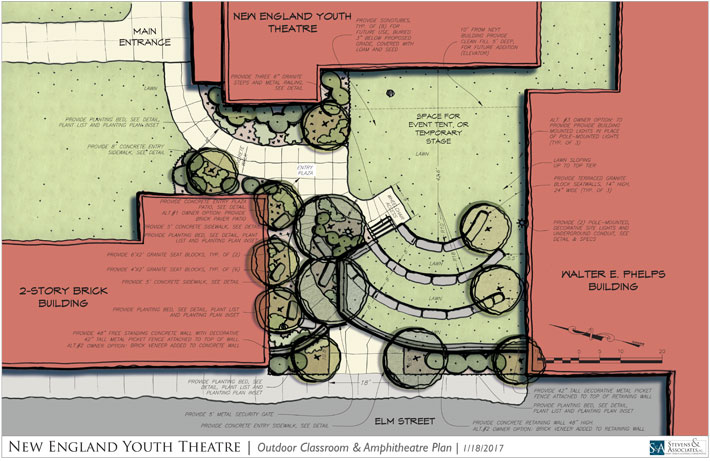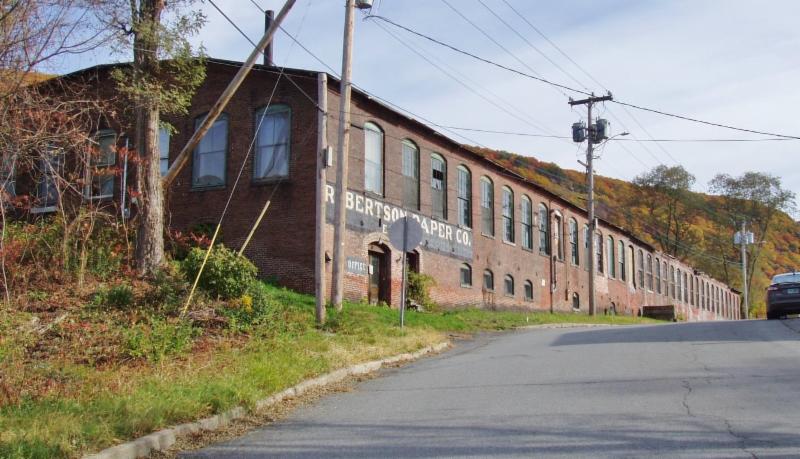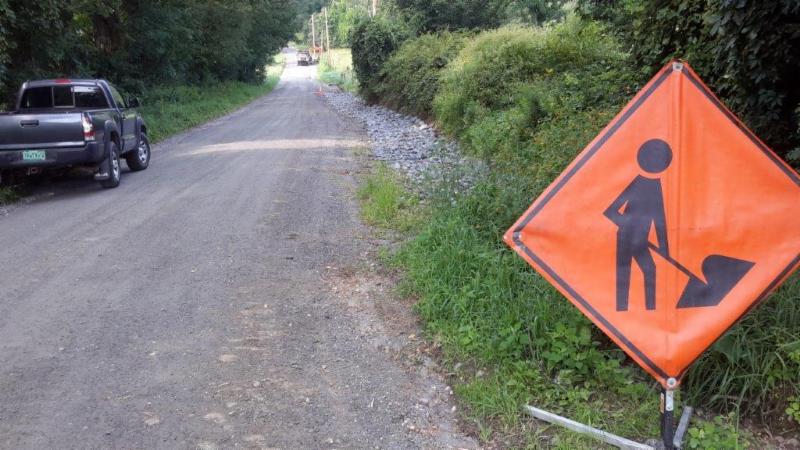**All Committee Meetings take place in the WRC Conference Room unless otherwise noted.
**All meetings are subject to change, please check the website for updates.
|
UPCOMING GRANT OPPORTUNITIES
National Endowment for the Arts
Art Works
DEADLINE
July 12, 2018
DEADLINE:
August 9
, 2018
New England Grass Roots Environmental Fund
DEADLINE: Rolling (Seed Grant)
USDA Rural Development - Community Facility Loans
& Grants
DEADLINE: Ongoing (contact USDA office)
Vermont Agency of Commerce and Community Development
DEADLINE: Rolling
DEADLINE: Rolling
Windham Foundation
Windham Regional Commission
DEADLINE: Rolling
DEADLINE: Rolling
Vermont Agency of Transportation
Upcoming Grants will
be a regular column in the
WRC Newsletter, for
a complete
For additional
information about
grant possibilities
for your projects
please contact Susan at
|
|
Does Your Town Want a Traffic Study? Please Let WRC Know
Traffic count season is upon us! A time when WRC staff set out traffic counters and lay rubber tubes across roadways to gather data on the volume (number), speed, and class (type) of vehicles. So while we call these "traffic counts," we're really looking at more than just the number of vehicles; hence the phrase "traffic study" in the title.
If your town would like a traffic count-er...traffic study-done this summer, please let us know soon. Note that we only do studies at the request of towns; we don't respond directly to individuals or businesses that request a study.
For more information and a request form, please visit the
website.
|
|
Windham Wood Heat
The Windham Wood Heat Initiative (WWHI) experienced another wave of activity in the past month with four projects materializing. After an outreach effort to local non-profits, the New England Youth Theater, the Winston Prouty Center (formerly the Austine Campus), and Kurn Hattin Homes for Children are all participating in the program by receiving comprehensive audits performed for each of the ten buildings. This includes a feasibility study of district heating for four buildings on Kurn Hattin campus and five buildings on the Winston Prouty campus. The WWHI has also developed a feasibility study for district heating the Retreat Farm. With the completion of these reports, the institutions will have a useful document which will identify not only the feasibility of an advanced wood heat system, but will also identify conservation measures they can pursue to ensure the buildings are performing at their highest feasible efficiency.
This surge in activity follows six installations completed over the course of the Fall in the Flood Brook Union School, Green Street School, Guilford Elementary School, Marlboro School, the Putney Landing Housing Development, and the New England Center for Circus Arts.
The Windham Wood Heat Initiative will yield community benefits, business success, and high performance buildings based on a sustainable local forest industry. This $1.6 million program - funded through the Clean Energy Development Fund (CEDF) in accordance with the settlement agreement between Entergy Vermont Yankee and the state - will help municipal, school, and public service institution buildings convert to heating with local, sustainable wood while addressing those buildings' energy efficiency and durability needs. The program also includes public education, training for local building professionals, fuel supply procurement and other elements needed to make Windham County a long-term center of advanced wood heat technology and practice.
|
Executive Director
Associate Director
Office Manager
Finance Manager
Senior Planner
Senior Planner
Planner
|
|
 |
|
WRC Adopts New Regional Energy Plan!
The WRC voted to adopt the newly completed Windham Regional Energy Plan as an amendment to the WIndham Regional Plan at its meeting on April 24th.
The Energy Plan can be found
here
. The development and drafting of the energy plan took place over the past year and a half with an in-depth analysis of current energy use and projected energy use across heating, transportation, and electricity sectors in the Windham Region, identifies policies and pathways, and includes an analysis of renewable energy generation potential from newly developed maps.
The process included multiple stakeholder events, workshops, public meetings, committee meetings, and full commission meetings which engaged commissioners, energy professionals, activists, town officials, and members of the public to develop all the required elements of the energy plan.
The Energy Plan was also developed with technical assistance and guidance from the Department of Public Service as well as the three RPCs that previously adopted their energy plans (Bennington County Regional Commission, Two Rivers Ottauquechee Regional Commission, and Northwest Regional Planning Commission).
The Windham Regional Commission will be submitting the energy plan to the Department of Public Service for a Determination of Energy Compliance. If deemed compliant with these standards of Energy Compliance, the plan will receive substantial deference in the Section 248 energy permitting process. The plan will also serve as the basis for the region's review of town plan energy elements for Act 174 compliance. Developing an Act 174-compliant town plan energy element is at the option of the town, and is not required by statute.
Per statute, the plan will take effect 35 days after the date of adoption, which is May 29, 2018. Notice of the plan adoption has been sent to all towns in the region.
|
|
Brownfields Clean Up funded in Brattleboro and Bellows Falls
It will be a busy summer for brownfields clean up in southern Vermont. Windham Regional Commission's Brownfields Program recently signed two grant agreements for brownfield cleanups with the New England Youth Theatre and Art Center and Bellows Falls Area Development Corporation.
 An outdoor classroom and amphitheater are already under construction at the New England Youth
Theatre operation.
Bellows Falls Area Development Corporation
(
BFADC) will use their funding to clean

up
Robertson Paper Mill.
Redevelopment of this
property, on the Island in
Bellows Falls, is part of a
first step to implement the
Town
of Rockingham's Island Redevelopment Plan.
The Windham Region Brownfields Reuse Initiative (WRBRI) was established in 2000 with funding from the Environmental Protection Agency (EPA) and has been working hard to promote vibrant communities by facilitating Brownfields redevelopment. WRC Brownfields program provides funding for assessment and clean.
For more information contact Susan McMahon at x114.
|
WRC Educates 5-6
th Grade Students
About Water Science Through
The Confluence Project
The Confluence Project, a multi-discipline partnership between WRC, Vermont Performance Lab, Green River Watershed Alliance, and local schools, has begun making waves in the Windham Region. Aside from the impressive swath of public events being offered (see the full list of events here
www.greenriverwa.org/events) there is a piece focused on an innovative approach to water science education through the combination of art and science. Our ECOAmericorps Service Member, Billy Ernest, has begun the education portion of his service by visiting the 5th and 6th grade classroom at Marlboro Elementary. He will be visiting the classroom semi-weekly for the next five weeks. Students will learn about macroinvertebrate sampling and how biomonitoring of our rivers can indicate potentially impaired areas, the movement of rivers, and sources of pollution. There will even be field visits to put lessons into action!
This first visit's topic was streamside chemistry. Billy partnered with Ryan O'Donnell (Connecticut River Conservancy) to bring practical science applications into the classroom. In one "experiment," students blind tested two samples of water collected in bracketed fashion around a tributary known for acid mine drainage impairment. After the test they were asked if either sample was more acidic than the other. Students unanimously voted for the sample collected downstream of the tributary. It was an eye opening experience, and further explained that the way humans interact with the environment, either responsibly or not, has direct impacts to the landscape.
Each week these lessons will be paired with those of performance artist Lida Winfield, a pioneer in integrating dance into conventional learning. Students will examine the connections between river science and movement as they investigate their place in space. This combination is as useful as it is unique. These lessons will lead to a concrete foundation of understanding in river science, and allow accessibility in approaching these topics to a variety of learning styles. One of the goals of this partnership is to have students seek answers to bigger picture questions, such as "How does understanding this help me think beyond myself?" and "How can this help me understand the greater world and have more compassion?"
And WRC's role doesn't end with Marlboro Elementary. Billy has also acted as an educational consultant for Hilltop Montessori's stream table curriculum, and assisted in the development of exercises and lessons for that program. They say children are the future, and the WRC is dedicated to building that future through the offering of educational opportunities.
|
|
WRC will host "Watershed Identity" Panel Discussion to Promote a Sense of Place and a Call to Action
On Thursday, May 3
rd
, the WRC will host a panel discussion entitled "Watershed Identity: Finding Meaning in our Shared Waterways" at 7:00 at the Brattleboro Museum and Art Center. This is part of The Confluence Project, a creative placemaking partnership project with Vermont Performance Lab, Brattleboro Museum & Art Center, and Green River Watershed Alliance. Panelists include Rhonda Anderson (water/indigenous rights activist), Peter Forbes (writer, conservationist, and co-founder of Center for Whole Communities), and Steve Libby (Executive Director of Vermont River Conservancy).
Discussion facilitator Gaye Symington (President, High Meadows Fund) will lead these panelists in exploring such questions as; "Why do watersheds matter in our communities?," "How can we promote place-based meaning within our watersheds, and how would that impact flood resilience, ecological integrity, or community development?," "What does it mean to be a water protector in your community?"
So, what does "watershed Identity" even mean? "Watershed identity" is not a new concept, but it can often be difficult to conceptualize and understand. Essentially, it is a conglomeration of ideas that promote a sense of place within a watershed by imbuing it with meaning as a result of human action and interaction, and seeks to promote action within members of the community by connecting people with their landscape. It defines the areas where we live, and is highly akin to the idea of self-identity, but on a landscape scale.
Watershed identity is important to the Windham Region if our goal is to advocate for the health of our shared waterways. Why is this important? The Windham Region encompasses approximately 15 different watersheds! That's a lot of rivers, and even more tributaries. As we witnessed in 2011 with tropical storm Irene (and as recently as the heavy rain events in October 2017), increased flows in these rivers can lead to roadway infrastructure damage, and pose increased threats to homeowners living along our rivers. Additionally, most of these watersheds drain into the Connecticut River and flow directly to the Long Island Sound - an area that has become highly impacted by sediment pollution resulting from erosion, and nutrient run-off. Watershed groups around the Region are working to foster watershed identity so that they may be better rooted in the community to take on issues like these. The idea is that human relationships have a direct impact on the health of our waterways. If the community is cohesive in its support and action regarding watershed health, then they will be more resilient to water quality impacts and flood hazards.
|
|
|
Community members being citizen scientists by mapping vernal pools at a workshop coordinated by the Bonnyvale Environmental Education Center and WRC as part of the Green River Watershed Alliance's work
|
Studies have shown when people are connected to their land and view the area they live as a special place, they are better positioned to make decisions that help that place; such as changing daily behaviors, volunteering, or bigger picture ideas like voting.
The help accomplish this more cohesive approach to watershed planning, the WRC, through a grant from the High Meadows Fund, has been assisting the launch of the Green River Watershed Alliance. This group has engaged regional partners to generate and host public events that provide a common platform for community members of various backgrounds, and connect them with their watershed. So far, this has included vernal pool explorations, conservation easement workshops, art installations, and even school visits. However, the WRC will be pushing the concept of watershed identity further by facilitating direct conversation on the topic. As author Wendell Berry wrote, "Do unto those downstream as you'd have those upstream do unto you."
|
As the Roads Thaw, Grants in Aid Program Resumes Road Projects to Improve WaterQuality

The Municipal Roads General Permit (MRGP) intends to achieve significant reductions in storm water-related erosion from municipal roads, both paved and unpaved. Over time, municipalities will implement a customized, multi-year plan to stabilize their road drainage system through the MRGP. The Grants in Aid Program began in late spring 2017, and is a way for towns to receive reimbursement from VT Agency of Natural Resources (ANR) for proactively addressing MRGP standards on their hydrologically-connected road segments.
Beginning in July 2017, 18 towns in the Windham Region enrolled in this reimbursement program, and thereby committed to installing best management practices on selected road segments to reduce sedimentation into our waterways. Starting in July and running through October 2017, WRC planners have been conducting site visits with road and highway foreman and other town officials to identify road segments that currently do not meet MRGP standards, and whose improvement would help keep our streams clean and hopefully help maintain the roads in increasingly strong storm events.
Overall, ANR has awarded over $250,000 to those 18 towns in 2017 as reimbursements, once those identified roads segments were brought up to MRGP standards. Those funds went towards reshaping and stabilizing ditches, establishing filtered sheet flow away from the road, replacing undersized culverts, and establishing filtered and stabilized flow from the right of way and into stream or brooks. In 2017, the WRC, along with participating Road Foremen, identified about 9.5 linear miles of drainage improvements and many other upgrades to culvert infrastructure.
As the 2018 field season approaches, the WRC looks forward to reaching out to towns once again to assist with this reimbursement opportunity. The WRC is working with other regional planning commissions in the State and with ANR to release a municipal Letter of Intent in mid-May 2018 (which will be due back to the WRC in mid-July), through which towns in the Windham Region can confirm their enrollment with this program and proactively work towards MRGP compliance. The WRC will be assisting the towns by documenting pre- and post-construction conditions on these roads, and confirming MRGP compliance in consultation with the participating road foremen, and helping towns compile their expenses to receive reimbursement from VT ANR.
For more information about this Grants in Aid program or other water quality initiatives, please contact
Emily Davis at 257-4547 x 116.
|
Beginning the Update
of the Windham
Regional Plan
An update of the Windham Regional Plan is getting underway. We invite everyone to read the current regional plan, the Windham Regional Transportation Plan, and even the just-adopted Regional Energy Plan to let us know what you feel could be improved. Are the underlying assumptions about existing and future conditions valid? Are the goals and objectives for the future of the region the right ones? Do the current policies get us to where we want to be? Have those policies been effective? What specific actions can the Commission take to move the region forward per the direction of the plan? The Committees of the WRC will be discussing these questions and more over the coming 6 months. Everyone's input is welcome!
Plans are meant to be evaluated and updated on a regular basis. While the state has extended the required update period from 5 to 8 years for both town and regional plans, enough has happened and is happening to prompt us to get the review and update process underway now. We've had a major shift in the economy of part of the region with the closure of Vermont Yankee. We've ramped up collaboration with our counterparts in Massachusetts and New Hampshire, recognizing we have shared socioeconomic interests, especially at the household level. New laws are in place including those relating to clean water, forest block continuity, river corridors, and regional and town energy planning. The evolution of energy planning and rules within Vermont and the New England region has created a dynamic renewable energy development situation. What was the Windham Regional Comprehensive Economic Development Strategy (CEDS) is being expanded to include all of the Bennington Region to create a Southern Vermont CEDS. We've had more experience with damaging extreme precipitation and wind events. Rates of poverty and hunger are on the increase. Effects of the opioid epidemic are being felt throughout the region. We've seen new investment in ski resorts. Rail service to Greenfield, Massachusetts is set to expand by an additional 4 trips per day, leading to the potential for increased service into Vermont. Might this make commuter rail service to the region a possibility within the next decade? Case law has further defined the standing and application of regional and town plans. Act 250 is being reviewed. VTrans is revising its project prioritization process in a way that would enable regions to send projects up for consideration. And the Agency of Natural Resources is seeking greater input from the regions and towns in basin planning, as well as prioritization of basin plan projects. There's a lot going on!
By November we hope to have a sense of the full scope of the plan update, and from that scope we'll develop a detailed work plan. The goal is to take the time needed to do the work that needs doing well, involving towns and the public every step of the way. Please let us know what issues you feel need to be addressed.
|
|
|